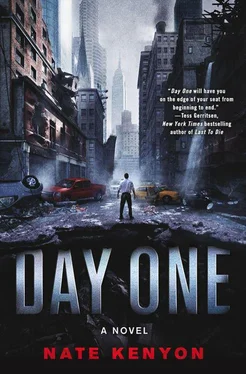Members of Anonymous could be brilliant. But many of them were also eccentric outliers who shunned society and were hardwired to rebel against authority. Hawke had found that exciting earlier in his life, but not anymore. When you’re starting a family and the cops knock on your door, it changes things, he’d said to Rick, right before the man had gone to jail for his role in leaking classified government documents online. I can’t go down with you.
A chat window popped up, and Rick, using his familiar alias rodeoclown, was there: Something’s going on. Something big.
No preamble, no mention of their colorful history or the fact Rick had served eighteen months in a federal prison while Hawke had walked away. That was Rick’s style, when he communicated at all, and Hawke knew better than to push it. Besides, they only had three minutes.
Operation Global Blackout? he typed.
No fucking idea. Not involved.
Who then? Admiral Doe?
Someone good. Like fucking brilliant. Better than any of us. There was a pause. Tried to track him. Found some footprints in the sand that pointed toward Eclipse IPs, but it left me sinking fast and then fried my board. Like it was the cat and I was the mouse.
Eclipse. Hawke leaned closer, growing more intrigued . Fried your board? How is that possible?
Electrical surge.
Hawke sat back. That didn’t make any sense. Maybe it had been a coincidence. But Rick was always careful; his equipment was certainly shielded.
He typed: Rumor mill on Doe? Connected to DOJ attack?
Nobody knows. He’s a ghost.
Hawke typed: Where are you?
Nothing for a moment, and then: Never mind. Authorities after everyone. Big pressure on this, I’m in crosshairs.
Just tell them you’re not involved—they’ll trace everything soon enough and see.
Not that simple. I’m being set up.
Hawke shook his head: Why?
Don’t know. Something’s happening. Find out who Doe is.
You know I can’t do that.
Damn well can. You’re the best at this. When you want to be.
As he was about to type a reply, the screen flickered and went blank. Hawke paused, fingers over the keys, still not entirely sure what he wanted to write. They had another minute before the session would automatically terminate, and this wasn’t the way it would happen anyway. This was like hardware failure.
He was about to try to crash the system and restart when the screen came back up as if nothing had happened. His chat session with Rick was gone, but everything else was intact.
Except it wasn’t, not exactly.
Hawke stared at the message board, trying to make sense of what he saw. At first glance, the board looked the same, the same members posting in the same order, at least as he remembered it. But the contents of the posts were entirely different. Board members had gone from expressing confusion and anger over Operation Global Blackout to taking responsibility for it. A member named crow17 claimed he had been one of many hundreds of thousands who had aimed a low-orbit ion cannon at the DOJ servers last night, taking them down. Another poster talked about being a part of this morning’s call to action through Twitter. Someone else talked about going after the New York Stock Exchange next, then creating an emoticon message that would self-populate through chains of brokerage accounts and wipe out all transactions for the users.
Hawke remembered seeing both threads when he first logged on, and they were entirely different. And there were more like that. It was as if someone had erased the text of each message and rewritten them, one by one.
It was one thing to crash a site but quite another to erase and then generate entirely new content on the fly.
Who could possibly have done something like that?
In spite of his concerns about getting involved with Rick, Hawke went off sniffing like a bloodhound. He left the corrupted board and logged on to Twitter, scrolling through the hash tags on Anonymous, Admiral Doe, DOJ and Operation Global Blackout. Anonymous had been busy. There were hundreds of tweets in the last few hours by those claiming to be associated with the hacker collective: the DOJ takedown, an attack on the servers of French government, the leaking of private FBI transcripts, service interruptions and messages posted on dozens of police Web sites across the country, a theft of private data from Goldman Sachs accounts, calls to action in protests around the world for various causes like censorship, corruption, injustice and religion, in Austria, Belgium, Britain, Bulgaria, the Czech Republic, France, Germany, Hungary, Luxembourg, Malta, the Netherlands, Poland, Portugal, Romania, Scotland, Sweden, Switzerland, the United States….
The activity was staggering, and through it all Hawke sensed some kind of common thread that he couldn’t quite grasp but scared the hell out of him. The whole point of Anonymous was that it didn’t govern itself, had no permanent set of goals or leaders; it existed simply as a movement for change and a way of pushing back against authority and censorship in any form. It had begun with a small group of mischief-makers and had always kept that playful edge, and it was fluid, constantly evolving, an online, shared consciousness driven by the whims of the group. Hawke had always imagined it as a gigantic flock of geese, moving in unison in a seemingly random pattern.
This was different. There was purpose here, and it was deadly serious.
Hawke focused his search on New York, and found dozens of tweets referring to gatherings across the city. One in Bowling Green Park, protesting Wall Street greed; another near Downtown Hospital to protest unaffordable health care; a third in Seward Park to protest immigration laws; a fourth and fifth in SoHo and the Theater District to protest censorship; a sixth outside of Rockefeller University to protest lack of affordability in higher education. There were protests on wealth inequality in J. Hood Wright, Inwood Hill, Highbridge and Marcus Garvey parks.
Each call to action had been tweeted by Admiral Doe.
Hawke thought of the man with the duffel bag, and the others on the train, all going in different directions. He pulled up a map, plotted the protest locations. He sensed some kind of pattern, but no matter how hard he stared at the screen, it wouldn’t emerge.
Another cup of coffee might help him focus. He got up, took off his suit jacket and draped it over his chair and began to make his way toward a tiny back room where a pot was usually brewing.
The first thing Hawke noticed when he opened the door was the heat; it puffed out at him. The room’s lights blinked on automatically. The room was little more than a windowless supply closet, lined with open shelves stacked with reams of paper and office supplies on the right side and a long worktable on the left with a small refrigerator underneath it. Someone had brought a container of donut holes, and powdered sugar and cinnamon dotted the table next to the paper cups and containers of sugar packets and creamer, along with the monstrous coffee machine.
The room had to be twenty degrees hotter than the office, and the smell of coffee was strong. Probably scalded. It figured; the machine was brand-new, with all the bells and whistles, one of those complicated stations that people with too much money paid through the nose for in order to create barista-style drinks in their pajamas, and yet it couldn’t even brew a decent cup. Bradbury had acted like a proud father when he’d shown it off on Hawke’s first day in the office. It did pretty much everything from grinding beans and foaming milk to making flavored drinks. It even had an app for remote scheduling, which Bradbury had insisted on demonstrating. The entire outfit practically screamed, Look at me; I’m sophisticated!
Читать дальше












